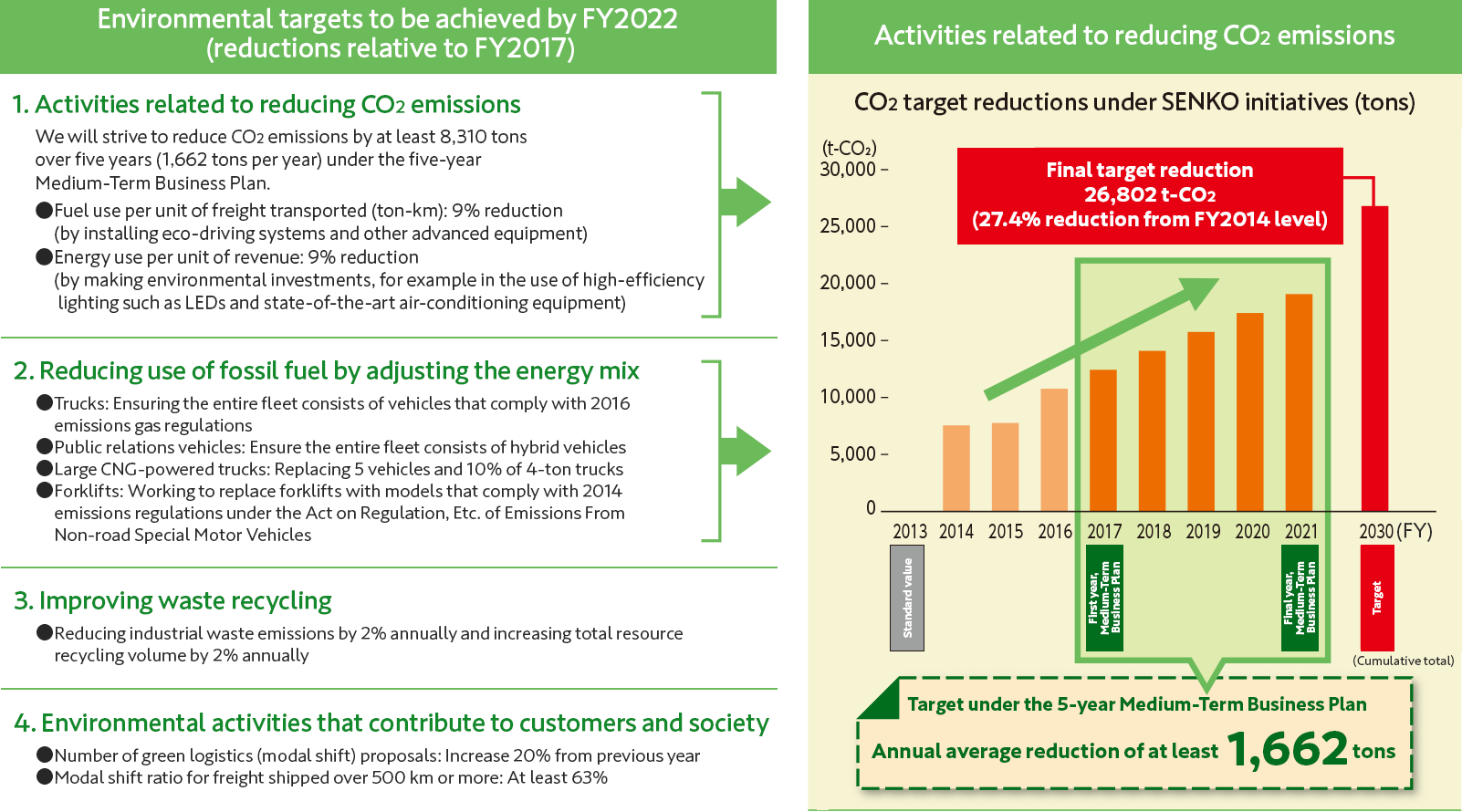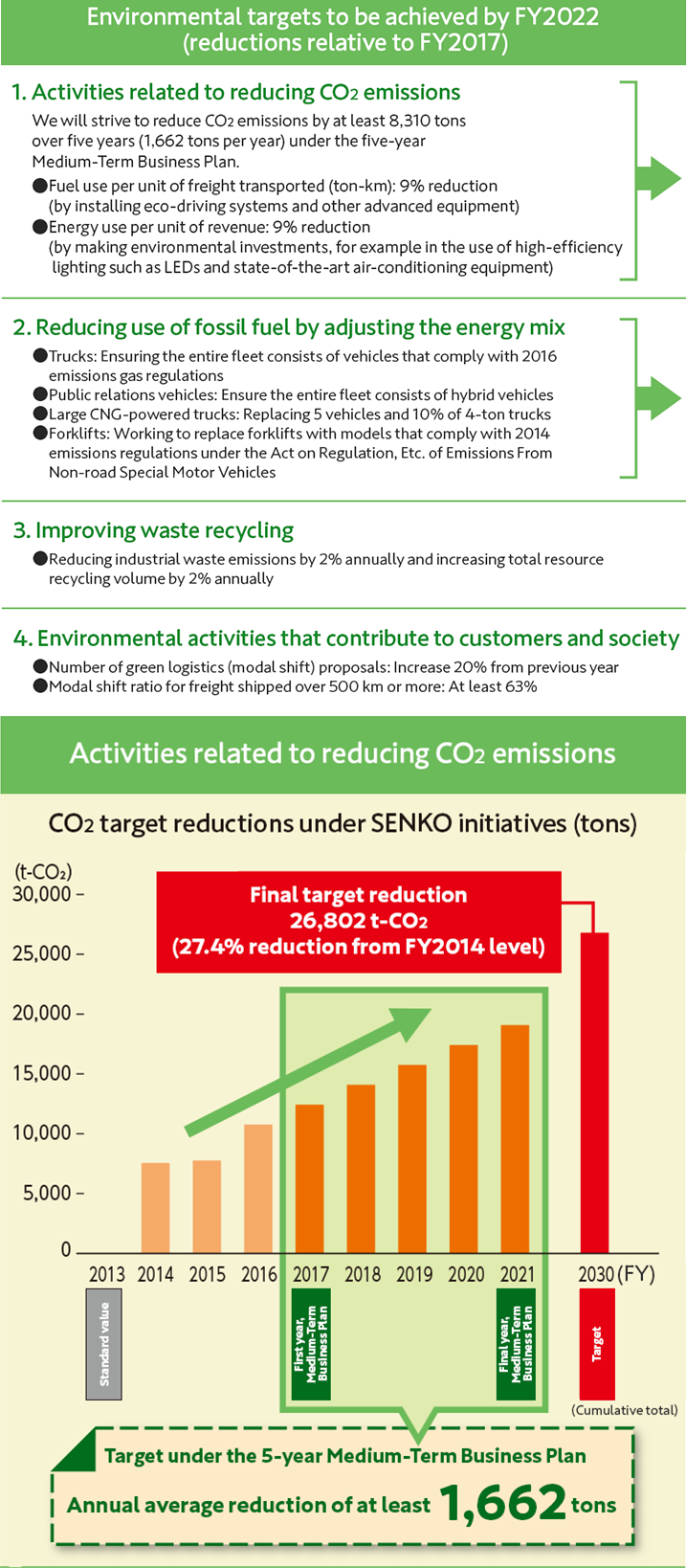| Units | FY2021 | FY2022 | FY2023*2 | ・・・・ | FY2027 target | |
|---|---|---|---|---|---|---|
| CO₂ emissions | t-CO₂ | 245,179 | 271,439 | 268,288 | ・・・・ | -----*3 |
| CO₂ emissions per 1 million yen of revenue | t-CO₂/¥1 million | 1.01 | 1.05 | 0.98 | ・・・・ | 0.91 |
SENKO HOLDINGS
CO₂ Reduction Initiatives
The SENKO Group’s Decarbonization Strategy
Approach to decarbonization
Reflecting its commitment to helping achieve the commitment Japan made to the world to reduce CO₂ emissions to 46% of FY2013 levels by FY2030 (including a 35.0% reduction in the transport sector and a 51.0% reduction for other operations)*1 in order to realize a carbon-neutral society, the SENKO Group is working to improve its environmental performance on behalf of customers and local communities.
In addition, we are working actively to visualize our environmental activities as a leading environmental company.
*1:In April 2021, Japan announced its intention to reduce greenhouse gas emissions by 46% (relative to FY2013 levels) by FY2030 and to embrace the more ambitious goal of a 50% reduction based on a cabinet resolution approving the Plan for Global Warming Countermeasures on October 22, 2021.
Strategy 1: Groupwide initiatives
Energy-saving measures
We are working to make more efficient, effective use of electrical energy by switching to LED lighting and alternative air-conditioning technologies at multiple large facilities.
Renewable energy
The SENKO Group launched a solar power business that supplies power to various power companies in FY2014 as part of an effort to popularize use of renewable energy. In addition, we are involved in the self-consignment of power to Group companies. Going forward, we will accelerate our renewable energy activities.
Greenification of procurement
The Group is working to realize a circular economy by reducing new resource use and recycling and reusing existing resources.
For example, our logistics centers previously disposed of stretch film used to secure freight as industrial waste but now recycle all such plastic as part of a joint initiative with a recycling processor so that it can be reused to produce 100% recycled garbage bags.
Strategy 2: Decarbonization of the logistics business
Greenification of Group shipping equipment and logistics facilities
We are adopting environmentally friendly trucks that generate fewer CO₂ and NOx emissions, including electric and hybrid trucks. We are taking advantage of the environmental benefits of such vehicles, which emit no smoke or sulfur oxides, to meet customers’ desire for low-carbon shipping.
Implementation of a modal shift
The Group was one of the earliest proponents of green logistics as a way to reduce the environmental footprint of its operations. Our initiatives to realize a decarbonized society, for example by implementing a modal shift combining rail and marine transport, using larger trucks, and consolidating logistics facilities, have earned high praise.
Risk analysis and use of results in our businesses
We began disclosing information related to climate change in accordance with TCFD recommendations when our shares transitioned to the Prime Market in FY2023. We also launched the Sustainability Promotion Department and began disclosing materiality information that year.
We will move ahead with strategic investments in the logistics segment and the decarbonization of services in a planned and systematic manner by combining the two strategies described above.
Targets and Initiative Results
The SENKO Group assesses energy use and CO₂ emissions associated with its business activities and uses that information to inform its environmental protection activities. Under the five-year Medium-term Business Plan that began in FY2023, we are striving to realize sustained business growth through environmentally oriented activities such as strategic investments geared to achieve carbon neutrality using CO₂ emissions per unit of revenue*1 in our ground transport business as the principal indicator, with a FY2027 target of realizing a 10% reduction relative to FY2021.
*1:CO₂emissions per unit of revenue in the ground transport business: Calculated by dividing total CO₂ emissions by Logistics Business operating companies with domestic logistics, frozen and refrigerated logistics, and other logistics operations by the total direct revenue of those companies.

1. CO₂ emissions (domestic ground transport business)*1
- *1:Total for Scope 1 + Scope 2
- *2:Segment classifications and tabulation methods changed starting in FY2023. Since the ground transport business as well as CO₂ emissions per unit of revenue have been redefined, figures for past fiscal years have been recalculated.
- *3:The FY2027 CO₂ emissions target has yet not been calculated.
2.Renewable energy solar power generation
| Units | FY2021 | FY2022 | FY2023 | |
|---|---|---|---|---|
| Solar power generation*4 | MWh | 18,502 | 18,990 | 22,158 |
- *4:Including solar power generated at domestic SENKO facilities.
3.CO₂ reduction results
| Units | FY2023 | Percent of total | |
|---|---|---|---|
| Scope 1 (fuel-saving measures) | t-CO₂ | 2,100 | 51.7% |
| Scope 2 (power-saving measures) | t-CO₂ | 1,670 | 41.1% |
| Scope 3 (recycling-based society)*5 | t-CO₂ | 295 | 7.3% |
| Total | t-CO₂ | 4,065 | 100.0% |
- *5:Activities to reduce environmental impacts by ensuring cyclical use of resources through reuse and recycling.
4. Green logistics Modal shift rate*6
| Units | FY2023 | SENKO Co., Ltd. | % | 64.7 |
|---|
- *6:Modal shift rate = Rail and marine transport over distances of 500 km or more / all transport volume traveling distances of 500 km or more
5.Environmentally friendly vehicle ratio
| Units | FY2023 | |
|---|---|---|
| Low-carbon diesel vehicles*8 | Vehicles | 5,715 |
| Hybrid vehicles | Vehicles | 121 |
| Natural gas-powered vehicles | Vehicles | 37 |
| Electric vehicles | Vehicles | 11 |
| Environmentally friendly vehicles, total | Vehicles | 5,884 |
| Total sales vehicle fleet | Vehicles | 6,378 |
| Environmentally friendly vehicles as a percentage of entire fleet | % | 92.3% |
- *8:Low-carbon diesel vehicles: Vehicles that comply with New Long Term, Post New Long Term, and Post Post New Long Term standards.
Environmental indicators and targets
1. Breakdown of the SENKO Group’s CO₂ emission
| INPUT | OUTPUT | ||||
|---|---|---|---|---|---|
| Fuel consumption*1 kL |
Power use MWh |
Scope1 t-CO₂ |
Scope2 t-CO₂ |
Total t-CO₂ |
|
| SENKO Group total*2 | 129,212 | 210,744 | 347,622 | 87,518 | 435,140 |
- *1:Fuel use has been calculated as crude oil (kL) equivalent.
- *2:The SENKO Group total encompasses all consolidated companies in Japan, including SENKO Co., Ltd.
2. SENKO Group CO₂ emissions, annual trend*3
| Units | FY2021 | FY2022 | FY2023 | |
|---|---|---|---|---|
| SENKO Group total | t-CO₂ | ー | 420,648 | 435,140 |
| CO₂ emissions per unit of revenue | t-CO₂/¥1 million | ー | 0.86 | 0.79 |
| Of which, ground transport business emissions | t-CO₂ | 245,179 | 271,439 | 268,288 |
| CO₂ emissions per unit of revenue | t-CO₂/¥1 million | 1.01 | 1.05 | 0.98 |
- *3:Segment classifications and tabulation methods changed starting in FY2023. Since the ground transport business as well as CO₂ emissions per unit of revenue have been redefined, figures for past fiscal years have been recalculated.
3. FY2023 CO₂ emission reduction target and results (t-CO₂)
| CO₂ reduction target | Results | Achievement rate |
|---|---|---|
| 4,000 | 4,065 | 102% |
4. FY2023 priority measures and reductions (t-CO₂)
| Priority measures | CO₂ reductions (t) | ||||
|---|---|---|---|---|---|
| Scope1 | Fuel-saving measures | (1) Transition to energy-saving vehicles | (2) Transition to environmentally friendly forklifts | (3) Other (installation of environmentally friendly equipment) | 2,100 |
| Scope2 | Power-saving measures | (1) Transition to new power companies and rate revisions | (2) Transition to energy-saving equipment (LEDs, air conditioning) | (3) Use of solar power-derived renewable energy | 1,670 |
| Scope3 | Recycling-based society | (1) Recycling of wood pallet waste | (2) Use of retreaded tires | 295 | |
| Total | 4,065 | ||||
5. Green logistics proposals and CO₂ emission reductions
| FY2023 | ||
|---|---|---|
| Reductions in CO₂ emissions from proposing improvements in logistics systems to customers, for example implementing a modal shift, consolidating facilities, utilizing joint shipments, or using larger vehicles | Number of contracts | CO₂ reductions t-CO₂ |
| 42 | 1,270 | |
Environmental targets under the five-year Medium-Term Business Plan
We've been working to achieve the following environmental targets since FY2018 under our five-year Medium-Term Business Plan (SIP21):
Approach to the 6th Environmental Master Plan (FY2018 to FY2022)
In an effort to achieve the commitment Japan made to the world to reduce CO₂ emissions to 27.4% of FY2013 levels by FY2030 (in the transport and logistics sectors), the SENKO Group will realize the goal of becoming a leading environmental corporate group by striving to improve its environmental performance on behalf of customers and local communities and working actively to visualize environmental activities that align with business activities centering on logistics.


 >
> - Sustainability >
- Environment >
- CO₂ Reduction Initiatives


